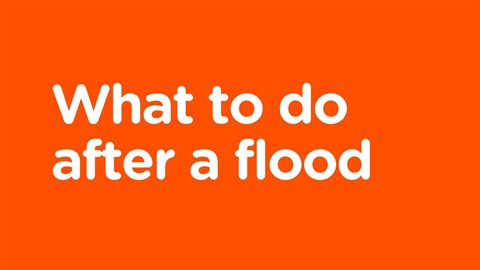Recovering from a flood

Floods and storms can happen in Palmy at any time, so check out this page for what to do during the clean-up process.
We’re here to support you during the recovery period, so if you have any questions, please call us on 06 356 8199. We’re here to help and keep you safe.
In an emergency, call 111.
If your property is damaged
- Don't do anything that puts your safety at risk or causes more damage to your property.
- Turn off power if any electronics are in floodwaters.
- Contact your insurance company as soon as possible.
- If you rent your home, contact your landlord and your contents insurance company.
- Take photos of any damage. It will help speed up assessments of your claims.
Power
Powerlines in Palmerston North are taken care of by Powerco.
If there’s imminent danger, such as fallen lines or a gas leak, call Powerco immediately.
For electricity network emergencies, phone: 0800 27 27 27
For gas network emergencies, phone: 0800 11 848
All other emergency enquiries, phone: 0800 769 372
For further updates and advice on what to do if you experience an outage and need to get reconnected, visit the Powerco website or Facebook page
Cleaning up after a flood
Clean and dry your house and everything in it. Floodwater can make the air in your home unhealthy. When things get wet for more than two days, they usually get mouldy. There may also be germs and bugs in your home after a flood.
Mould may make some people with asthma, allergies or other breathing problems sick.
Talk to your doctor or another medical professional if you have questions about cleaning or working in a home that has been flooded. If there is a large amount of mould, you may want to hire professional help to clean up the mould. Disinfect metal pans and utensils by boiling them in clean water.
Protect yourself
Protect yourself by wearing:
- a certified respirator
- goggles
- gloves
- sturdy footwear
- protective clothing that covers your arms and legs
Throw away
- anything that was wet with flood water and can’t be cleaned
- any wooden spoons, plastic utensils, and baby bottle teats and dummies if they have been covered by floodwater. There is no way to safely clean them.
For any flood-damaged items that won't fit in your council rubbish bag, please take them to a transfer station.
Food safety after a flood
Throw away food and drinking water that has come into contact with floodwater, including canned goods. Avoid drinking or preparing food with tap water until you are certain it is not contaminated. Follow any boil water notice instructions from your local authorities.
For more information on food safety during and after an emergency, visit mpi.govt.nz
Insurance
If your home, car, or contents have been damaged by the severe weather, take photos before you remove or repair anything and report it to your insurance company as soon as possible. You only need to contact your insurance company and they’ll let you know what you need to do next and how to claim.
If you need to make your home safe, sanitary, secure, and weather tight, please record the work done, take before and after photos, and keep copies of the bills you paid.
If you don't have house insurance but do have contents insurance, speak to your insurer about what is covered. Make sure you take lots of photos and keep good records before you throw anything out, where possible.
Financial support from Work and Income
Support and assistance may be available if you've been directly affected by the flooding across the country. There are lots of ways Work and Income can help and you don't have to be on a benefit.
Advice for landlords and renters
If you are the tenant or landlord of a rental property, you can find information on your rights and obligations at tenancy.govt.nz or by phoning 0800 TENANCY (0800 836 262).
Health and wellbeing
It's important to try and get enough sleep during these challenging times. You can find some good tips on the DHB-endorsed Health Navigator website: Sleep tips
Explain what is going on to children. Take time to talk to them, and to listen. Find resources for supporting children on the Kids Health website: Coping with a natural disaster
Anxiety is very common during an emergency event such as flooding and evacuations. This is a normal response to a stressful situation. Talking to people and helping others can be both therapeutic and useful.
If you need support for yourself or for others:
- call your general practice, after-hours GP practice or Healthline on 0800 611 116
- free-call or text 1737 to talk to a trained counsellor.